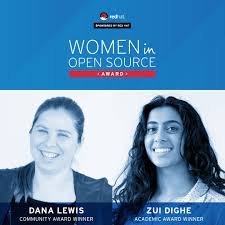Dana Lewis
See the following -
7 Cool Little Open Source Projects That Stood Out in 2016
 In the early days of the open source movement, a lot of the attention was on operating systems, and later on large content management systems. These days, containers are mentioned regularly even in mainstream news outlets. The big tech stories are great, but they miss the other great activity in the niches of the open source space. I've rounded up seven interesting lesser-known projects from the past year. You can see more articles about projects like this in my Nooks and Crannies column...
In the early days of the open source movement, a lot of the attention was on operating systems, and later on large content management systems. These days, containers are mentioned regularly even in mainstream news outlets. The big tech stories are great, but they miss the other great activity in the niches of the open source space. I've rounded up seven interesting lesser-known projects from the past year. You can see more articles about projects like this in my Nooks and Crannies column...
- Login to post comments
Build Your Own Open Source Artificial Pancreas System to Regulate Insulin Delivery
 In her Day 2 OSCON keynote, Dana set out reminding us that Type I diabetes, suffered by millions of people around the world, is incredibly complicated to manage...The solution is an artificial pancreas, which acts to close that loop by monitoring and adjusting insulin levels, just as the normal pancreas does. But those devices are not yet available on the commercial market, and won't be for some years yet. Enter the OpenAPS project (Open Artificial Pancreas System); find it here on GitHub. "OpenAPS is a simplified Artificial Pancreas System (APS) designed to automatically adjust an insulin pump's basal insulin delivery to keep blood glucose (BG) in a safe range overnight and between meals"..
In her Day 2 OSCON keynote, Dana set out reminding us that Type I diabetes, suffered by millions of people around the world, is incredibly complicated to manage...The solution is an artificial pancreas, which acts to close that loop by monitoring and adjusting insulin levels, just as the normal pancreas does. But those devices are not yet available on the commercial market, and won't be for some years yet. Enter the OpenAPS project (Open Artificial Pancreas System); find it here on GitHub. "OpenAPS is a simplified Artificial Pancreas System (APS) designed to automatically adjust an insulin pump's basal insulin delivery to keep blood glucose (BG) in a safe range overnight and between meals"..
- Login to post comments
Health Tech Podcast: How One Woman Built Her Own Artificial Pancreas and Started a DIY Movement
 Dana Lewis has Type 1 diabetes, which means her pancreas doesn’t work the way it should: It doesn’t make the insulin she needs to survive. So, she built a new one. It’s not a biological organ. Lewis’ artificial pancreas system (APS) is an open-source computer system that monitors her blood sugar level and gives her body insulin as needed, building on the insulin pump and glucose monitor that she’s been using for years...
Dana Lewis has Type 1 diabetes, which means her pancreas doesn’t work the way it should: It doesn’t make the insulin she needs to survive. So, she built a new one. It’s not a biological organ. Lewis’ artificial pancreas system (APS) is an open-source computer system that monitors her blood sugar level and gives her body insulin as needed, building on the insulin pump and glucose monitor that she’s been using for years...
- Login to post comments
HLN's Report on Patient Centered CDS Learning Network Conference
 The Learning Network is an initiative funded by the Agency for Healthcare Research and Quality (AHRQ) whose goal is to encourage collaboration and development of tools and resources to support clinical decision support (CDS) as it relates to individual patients and their caregivers. This work is an offshoot of the Patient-Centered Outcomes Research (PCOR) initiative which focuses on the relationship between healthcare providers in patients in making better, more informed, healthcare decisions. A sister project to the Learning Network is the AHRQ-funded CDS Connect Repository which has begun to house shareable CDS artifacts which represent evidence-based standards of care.
The Learning Network is an initiative funded by the Agency for Healthcare Research and Quality (AHRQ) whose goal is to encourage collaboration and development of tools and resources to support clinical decision support (CDS) as it relates to individual patients and their caregivers. This work is an offshoot of the Patient-Centered Outcomes Research (PCOR) initiative which focuses on the relationship between healthcare providers in patients in making better, more informed, healthcare decisions. A sister project to the Learning Network is the AHRQ-funded CDS Connect Repository which has begun to house shareable CDS artifacts which represent evidence-based standards of care.
- Login to post comments
How Medical Device Manufacturers Inject Copyright Into Treatments
 Arguments for proprietary data hoarding have been aired in the computer movement for decades, and have been decisively overturned by open source advocates and security experts. The real question is why any patient should be denied access to data that can improve his quality of life and chances of survival. In an age where "patient activation" and "Quantified Self" are buzzwords uttered throughout the medical industry, it is inconceivable that it could tolerate the present situation.
Arguments for proprietary data hoarding have been aired in the computer movement for decades, and have been decisively overturned by open source advocates and security experts. The real question is why any patient should be denied access to data that can improve his quality of life and chances of survival. In an age where "patient activation" and "Quantified Self" are buzzwords uttered throughout the medical industry, it is inconceivable that it could tolerate the present situation.
On the Importance of Patient Empowerment and Open Source: A Medicine X panel Weighs In
It’s your body, so you should have access to all of your medical data, right? This morning at the Medicine X session on data and devices, I learned that liberating your own medical data — or devices — will probably not be so simple. The conversation was started by Ben West, a software engineer and co-founder of the Nightscout Project, which supports the creation of open-source technology for people with Type 1 diabetes...
- Login to post comments
Red Hat Announces 2018 Women in Open Source Award Winners
 Red Hat, Inc...today announced Dana Lewis, founder of the Open Artificial Pancreas System (OpenAPS) movement, and Zui Dighe, a Duke University student, as the 2018 Women in Open Source Award winners. Both will be recognized today at Red Hat Summit, which is taking place in San Francisco this week. In its fourth year, the Women in Open Source Awards were created and sponsored by Red Hat to honor women who make important contributions to open source projects and communities, or those making innovative use of open source methodology.
Red Hat, Inc...today announced Dana Lewis, founder of the Open Artificial Pancreas System (OpenAPS) movement, and Zui Dighe, a Duke University student, as the 2018 Women in Open Source Award winners. Both will be recognized today at Red Hat Summit, which is taking place in San Francisco this week. In its fourth year, the Women in Open Source Awards were created and sponsored by Red Hat to honor women who make important contributions to open source projects and communities, or those making innovative use of open source methodology.
- Login to post comments